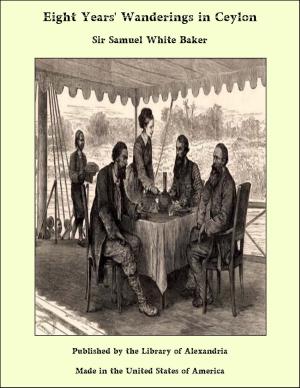The Princess Tarakanova: A Dark Chapter of Russian History
Nonfiction, Religion & Spirituality, New Age, History, Fiction & Literature| Author: | Grigory Petrovich Danilevsky | ISBN: | 9781465611352 |
| Publisher: | Library of Alexandria | Publication: | March 8, 2015 |
| Imprint: | Language: | English |
| Author: | Grigory Petrovich Danilevsky |
| ISBN: | 9781465611352 |
| Publisher: | Library of Alexandria |
| Publication: | March 8, 2015 |
| Imprint: | |
| Language: | English |
A storm has been raging for already three days. We have been so tossed about that it has been impossible to write. Our frigate, the Northern Eagle, is not far from Gibraltar. We have lost our rudder, and our sails are all torn, and now the current is carrying us south-eastwards. Where shall we land? what will become of us? It is night; the wind has fallen, and the sea is calmer. I am writing in my cabin. All that I have time to write of what I have seen and undergone, I will place in a bottle, and cast it upon the waters; and you who may chance to find it I entreat, by all that is sacred, to send it to its address. Ah! all-powerful God, grant me powers of memory; enlighten my poor soul, so torn with doubt! I am a sailor, Pavel Konsov, an officer in the navy of our most gracious Majesty, Empress of all the Russias, Ekaterina II. Five years ago, by the mercy of God, I succeeded in distinguishing myself at the famous battle of Chesma. All the world knows of our brave companions, Lieutenant Elien and Lieutenant Klokachov, who, on the night of the twenty-sixth of June, 1770, with four fire-ships and a few Grecian boats, hastily equipped, bravely advanced upon the Turkish fleet at Chesma, and rendered valuable assistance in its destruction. I, though so insignificant, had the good fortune, under cover of the fire-ships and the dark, to throw with my own hand, from our ship, January, the first fire-ball at the enemy. It was this fire-ball which, falling into and igniting the powder magazine, caused the explosion near the ship of the Turkish admiral from which the whole fleet took fire. Next morning, of over a hundred formidable men-of-war, some of sixty and some of ninety guns, frigates, galliots, and galères,—not one remained! On the surface of the waters were visible only wreckage and numbers of dead bodies. Our victory was sung in odes by the celebrated poet Heraskov, and several lines were dedicated to my humble self, until then unknown to the world. This poem was in every one’s mouth. The English in the Russian service—for instance, Mackenzie and Dugdale, who served on one of the fire-ships—took to themselves the credit for the greater part of the glory won at the battle of Chesma. But they did not really much surpass our own officers and men, who all distinguished themselves by their courage and gallantry. After this event I was found worthy of receiving the rank of lieutenant, and the Count Alexis Orloff, the hero of Chesma, having honoured me by his preference, I became his aide-de-camp. My career was thus, so far, very fortunate. Life, on the whole, smiled upon me. But sometimes a fatal destiny pursues man. Suddenly fortune ceased to favour me, angry maybe, at my abrupt, albeit forced, departure from my native land.
A storm has been raging for already three days. We have been so tossed about that it has been impossible to write. Our frigate, the Northern Eagle, is not far from Gibraltar. We have lost our rudder, and our sails are all torn, and now the current is carrying us south-eastwards. Where shall we land? what will become of us? It is night; the wind has fallen, and the sea is calmer. I am writing in my cabin. All that I have time to write of what I have seen and undergone, I will place in a bottle, and cast it upon the waters; and you who may chance to find it I entreat, by all that is sacred, to send it to its address. Ah! all-powerful God, grant me powers of memory; enlighten my poor soul, so torn with doubt! I am a sailor, Pavel Konsov, an officer in the navy of our most gracious Majesty, Empress of all the Russias, Ekaterina II. Five years ago, by the mercy of God, I succeeded in distinguishing myself at the famous battle of Chesma. All the world knows of our brave companions, Lieutenant Elien and Lieutenant Klokachov, who, on the night of the twenty-sixth of June, 1770, with four fire-ships and a few Grecian boats, hastily equipped, bravely advanced upon the Turkish fleet at Chesma, and rendered valuable assistance in its destruction. I, though so insignificant, had the good fortune, under cover of the fire-ships and the dark, to throw with my own hand, from our ship, January, the first fire-ball at the enemy. It was this fire-ball which, falling into and igniting the powder magazine, caused the explosion near the ship of the Turkish admiral from which the whole fleet took fire. Next morning, of over a hundred formidable men-of-war, some of sixty and some of ninety guns, frigates, galliots, and galères,—not one remained! On the surface of the waters were visible only wreckage and numbers of dead bodies. Our victory was sung in odes by the celebrated poet Heraskov, and several lines were dedicated to my humble self, until then unknown to the world. This poem was in every one’s mouth. The English in the Russian service—for instance, Mackenzie and Dugdale, who served on one of the fire-ships—took to themselves the credit for the greater part of the glory won at the battle of Chesma. But they did not really much surpass our own officers and men, who all distinguished themselves by their courage and gallantry. After this event I was found worthy of receiving the rank of lieutenant, and the Count Alexis Orloff, the hero of Chesma, having honoured me by his preference, I became his aide-de-camp. My career was thus, so far, very fortunate. Life, on the whole, smiled upon me. But sometimes a fatal destiny pursues man. Suddenly fortune ceased to favour me, angry maybe, at my abrupt, albeit forced, departure from my native land.















